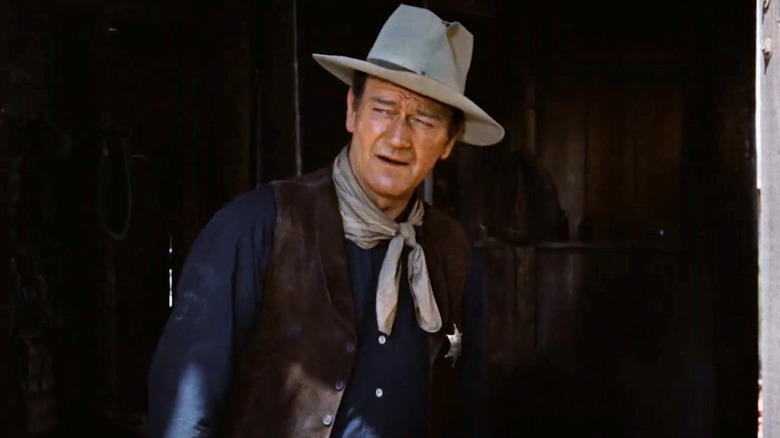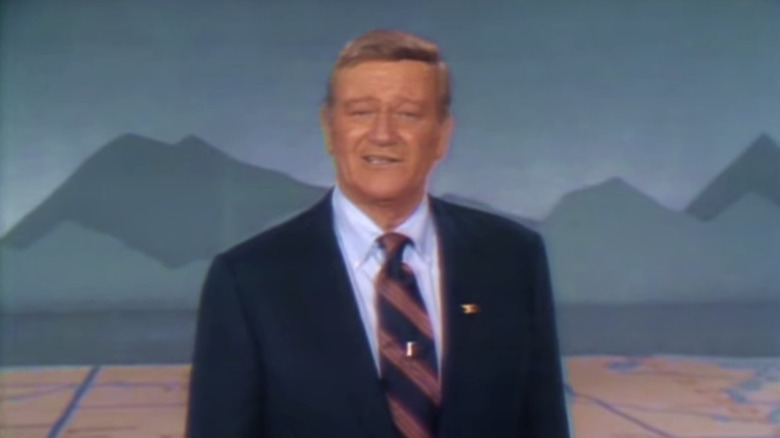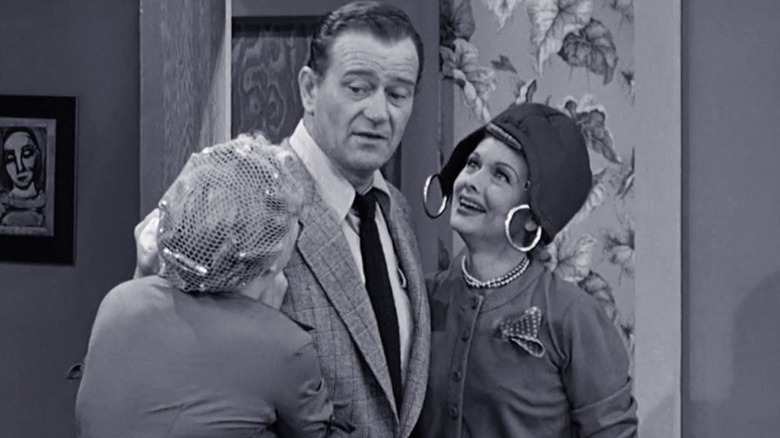John Wayne Had Very Brutal Thoughts About Starring In A Western TV Show
We may receive a commission on purchases made from links.
John Wayne made almost 200 films during his lifetime, becoming a true icon of the big screen in the process. He's less known for his TV career, of course, but that doesn't mean he never deigned to appear on the small screen. In fact, he popped up on the small screen throughout his lifetime, making numerous appearances on a variety of shows, including a role on a 1960s episode of the long-running Western series "Wagon Train." There's also Wayne's multiple stints on the seminal sitcom "I Love Lucy," in which he mostly played himself in situations where he became the victim of various farcical hijinks. Less well-known is the Duke's secret cameo on "Gunsmoke," a Western show that almost featured the actor in a starring role.
Indeed, Wayne was offered the role of lawman Marshall Matt Dillon on "Gunsmoke," but he turned it down. James Arness was subsequently cast as the character, mostly thanks to Wayne, who recommended him for the part. (Interestingly enough, Wayne later starred opposite Arness in the movie "Hondo," which led to a TV spin-off ... not that you'd catch Wayne in the small screen version.) So, why did the Duke pass on what would become one of the most influential Western shows ever made? The simple answer: He wasn't interested in headlining a weekly Western TV series.
In point of fact, though he would crop up in episodes of various shows, the screen legend seemed to maintain his aversion to starring in a TV series throughout his storied career. He clearly wasn't particularly fond of the idea of a lead role in anything episodic, especially if it was a Western, and "Gunsmoke" was just one of the earliest examples of his anti-small screen stance.
John Wayne thought TV Westerns were a little too cerebral
With 1970's "Swing Out, Sweet Land," Wayne starred in his first television special, which the New York Times called "a paean of patriotism." The small screen event featured multiple vignettes depicting various moments in U.S. history and featured an array of big stars of the era, from Jack Benny to Lucille Ball. Wayne was the host of the special, guiding viewers around a map of the United States and delivering patriotic platitudes with a dose of humor sprinkled in to keep things light. It wouldn't be the last time he blessed the small screen with his monolithic presence, however. Rather, the Duke went on to make several additional TV appearances throughout the '70s up to his death in 1979, mostly in specials where he played himself.
Despite his sporadic forays into TV, throughout his career, Wayne avoided recurring roles on series, and it seems that was mostly down to his negative view of the medium. The Times quoted him as saying, "Television has a tendency to reach a little," which in the Times' estimation was a reference to TV Westerns trying to glean psychological insights from their stories and characters. Wayne continued, "In their Westerns, they are getting away from the simplicity and the fact that those men were fighting the elements and the rawness of nature and didn't have time for this couch‐work."
John Wayne wasn't the biggest fan of TV in general
John Wayne's denigration of TV Westerns seems to have been about more than the genre itself. The actor spoke disparagingly of television throughout his career and evidently saw it as having a negative social impact. In "John Wayne: The Life and Legend," author Scott Eyman described the actor's feelings about TV as "ambiguous," quoting a veteran Wayne as saying, "I don't know whether I love it or hate it. But there sure has never been any form of entertainment so available to the human race with so little effort since they invented marital sex." According to the actor, the worst element of TV was that it had an "adverse effect on family life." "It kills off family conversation," he said. "And it's hard to get your children to read books." As Eyman noted, however, Wayne would have easily had a captive audience had he embraced TV.
There was also the debacle that involved the TV rights to "True Grit," which sparked a legal battle after Wayne pushed back against Paramount's decision to sell the rights before the film had left theaters. While that was ostensibly about giving "True Grit" a chance at a proper theatrical run, perhaps Wayne resented the fact that his movie was going so quickly to the medium he considered to be having such an "adverse effect" on the culture.


